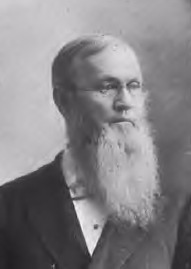 BREWSTER, Thomas Kelsey, of Oskaloosa, one of the
oldest and best established dentists of southeastern Iowa, was
brought up in Ohio, where his ancestors were among the very
earliest settlers.
His father, Francis Brewster, was born in Green county,
Ohio, November 29, 1795, and was a carpenter by trade. During
the later years of his life he owned and operated a farm near
Bell Brook, Ohio, where he resided until his death in 1874. He
was an abolitionist, and stood for the right in all reforms
that required great moral courage and perseverance. At the
time of his death he was in comfortable circumstances, and was
always held in great respect by the community in which he
lived. Dr. Brewster's mother was
Sarah Kelsey, who was born in Kentucky, May 5, 1802, and was
married to Francis Brewster, August 15,1822, near Centerville,
Ohio. She was an exceptionally brave and patient woman,
bearing with fortitude and courage all the many trials of
early frontier life. She became the mother of eight children,
of whom Thomas was the third. Mrs. Brewster died in 1853 at
Bell Brook, Ohio. Both parents joined the Methodist church
very early in life.
BREWSTER, Thomas Kelsey, of Oskaloosa, one of the
oldest and best established dentists of southeastern Iowa, was
brought up in Ohio, where his ancestors were among the very
earliest settlers.
His father, Francis Brewster, was born in Green county,
Ohio, November 29, 1795, and was a carpenter by trade. During
the later years of his life he owned and operated a farm near
Bell Brook, Ohio, where he resided until his death in 1874. He
was an abolitionist, and stood for the right in all reforms
that required great moral courage and perseverance. At the
time of his death he was in comfortable circumstances, and was
always held in great respect by the community in which he
lived. Dr. Brewster's mother was
Sarah Kelsey, who was born in Kentucky, May 5, 1802, and was
married to Francis Brewster, August 15,1822, near Centerville,
Ohio. She was an exceptionally brave and patient woman,
bearing with fortitude and courage all the many trials of
early frontier life. She became the mother of eight children,
of whom Thomas was the third. Mrs. Brewster died in 1853 at
Bell Brook, Ohio. Both parents joined the Methodist church
very early in life.
Dr. Brewster was born June 11,
1828, at Bell Brook, Green county, Ohio. His early life was
spent on a farm, working in the fields during summer and
attending district school in the winter. In 1840, he attended
the high school at Bell Brook. In 1850 and 1851 he studied
medicine and dentistry under Dr. A. S. Talbert, at Dayton,
Ohio, and in the fall of 1851 entered the Ohio Dental college
in Cincinnati, returning home in March, 1852. The same year he
located at Dayton, Ohio, where he enjoyed a good practice for
twenty two years. In 1874 he moved to Iowa, locating at
Oskaloosa, which he has made his home ever since. During his
twenty three years of residence in this place, he has
continued to practice dentistry, and he has certainly been
successful.
The doctor enlisted May 14, 1864,
in the 100-day service with the One Hundred and Thirty-first
Ohio National Guards, at Dayton, and served for five months.
His regiment was stationed at Baltimore, Md., and was mustered
out September, 1864.
He identified himself with the whig party early in
life, and voted with it until 1856, when the republican party
was organized.
Since that time he has always been a republican. His
first ballot was cast in 1852, when he voted for Gen. Winfield
Scott, for president. He is a member of Phil Kearney Post No.
40, G. A. R., and formerly belonged to the Independent Order
of Odd Fellows. At the age of 12 years he united with the
Methodist church, and remained a member until 1874, when he
and his wife brought their letters from the Grace M. E. church, of Dayton,
Ohio, and united with the First Congregational church of
Oskaloosa.
Dr. Brewster was married, April 12, 1858,
to Mary E. Snowden, in Green county, Ohio. Three children were
born to them, James B., Bertha B., and Kate S.; Bertha died in
1864 and Mrs. Brewster on the 3d of June,
1898.
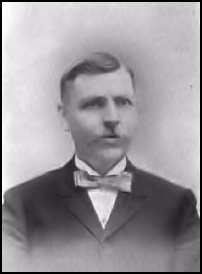 HAMBLETON, Albert F. N., a prominent real estate,
loan and insurance broker and examiner of titles, living in
Oskaloosa, was born in Forest Home, Poweshiek county, Iowa,
September 4, 1857. His father, Levi Hambleton, also a real
estate and loan broker, and president of the Central Iowa Loan
and Trust company, living in Oskaloosa, came to Iowa from Ohio
in 1855, and settled in Poweshiek county, where he laid out
the village site of Forest Home. He was engaged in the
mercantile and stock business for over twenty years, and in
the present business in Oskaloosa for the past eighteen
years. His father
was a strong anti-slavery man, belonging to the Friends'
society, and aided actively in conducting the "under-ground
railway " which carried so many slaves to freedom. He married
Ann Hanna, an aunt of Marcus A. Hanna, chairman of the
republican national committee in the campaign of 1896, and
United States senator from Ohio. Our Mr. Hambleton's mother,
whose maiden name was Mary H. Hall, is a native of
Pennsylvania. Her
ancestors were owners of a large tract of land, now that part
of the city of Philadelphia known as Hestonville. She is a
great-granddaughter of the well-known Judge Heston, of
Philadelphia.
HAMBLETON, Albert F. N., a prominent real estate,
loan and insurance broker and examiner of titles, living in
Oskaloosa, was born in Forest Home, Poweshiek county, Iowa,
September 4, 1857. His father, Levi Hambleton, also a real
estate and loan broker, and president of the Central Iowa Loan
and Trust company, living in Oskaloosa, came to Iowa from Ohio
in 1855, and settled in Poweshiek county, where he laid out
the village site of Forest Home. He was engaged in the
mercantile and stock business for over twenty years, and in
the present business in Oskaloosa for the past eighteen
years. His father
was a strong anti-slavery man, belonging to the Friends'
society, and aided actively in conducting the "under-ground
railway " which carried so many slaves to freedom. He married
Ann Hanna, an aunt of Marcus A. Hanna, chairman of the
republican national committee in the campaign of 1896, and
United States senator from Ohio. Our Mr. Hambleton's mother,
whose maiden name was Mary H. Hall, is a native of
Pennsylvania. Her
ancestors were owners of a large tract of land, now that part
of the city of Philadelphia known as Hestonville. She is a
great-granddaughter of the well-known Judge Heston, of
Philadelphia.
Albert F. N., spent his first
school days in the district school during the days of slab
benches, and when "lickin' and larnin' '' were almost
inseparable. At the age of 13 years he spent one year in the
preparatory department of Iowa college, at Grinnell. A year
later, he entered the high school in Oskaloosa, to which place
he had removed with his parents. He entered the first freshman
class in Penn college in 1873, that institution having been
organized that year. On account of financial losses by fire,
of his father, he gave up his college education in the
sophomore year, and at the age of 17 entered into employment
as a bookkeeper in a retail dry goods store in Oskaloosa,
where he remained for three years. He invested his savings in
a local building and loan association, and at the end of three
years he entered a partnership with his brother, in the
general merchandise, coal, grain and livestock business at
Springville, Iowa.
They did a very successful business for a period of
seven years, when Albert sold out his interest and returned to
Oskaloosa and engaged in the abstract business as examiner of
titles, making a study of real estate law. He has been in the
abstract, loan, real estate and insurance business in
Oskaloosa, from that time up to the present, with the
exception of three and one-half years spent in like business
in Des Moines, and six months in Chicago during the World's
fair, looking after business there. He is at present
treasurer of the Central Iowa Loan and Trust company of
Oskaloosa, organized in 1878, and a member of the firm of
Cowan & Hambleton, abstract, real estate, loan and
insurance agents.
Mr. Hambleton has been a republican
since becoming a voter, and has been actively connected with
the work of his party as committeeman and delegate to county
and state conventions. He was city clerk and secretary of the
public schools of Springville for several years. He united with the
orthodox branch of the Friends' church, when 12 years of age,
and has always been an active member of the church. He is a
trustee of the Iowa Annual Meeting of Friends, and clerk of
the representative or executive session of that body, and has
acted as its railway secretary for three years. He is also a
trustee of the Wells' fund, connected with the church, and has
for a number of years been one of the board of trustees of
Penn college, having acted as treasurer of that institution,
and is now one of the endowment trustees. He was president of
the Oskaloosa Y. M. C. A., for a number of years, and
secretary of the Mahaska County Sunday School association, of
which he is the present treasurer. He is an earnest temperance
worker and was very active during the campaign in 1882, in
support of the prohibitory constitutional amendment, and was
chosen as a member of the directory, and a delegate to the
national convention of the American Anti-Saloon league, from
Iowa Friends, at their last session.
Mr. Hambleton was married to Miss Josephs
Roberts, September 3, 1879. She is a daughter of Dr. Rueben L.
Roberts, now deceased, who was for several years United States
Indian agent of the Shawnee tribe. They have one child living,
Alma R., aged 6 years. A son died in
infancy.
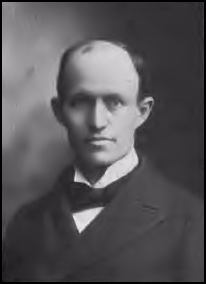 HOFFMANN. Phil., one of the most deservedly popular
young newspaper men in the state, was born and reared in the
town in which he now lives and works, the city of Oskaloosa.
He was born August 16, 1868, and is the son of Philip
Hoffmann, Sr., and Eleanor Addy Hoffmann. He received a good
education in the public schools of Oskaloosa, and in Penn
college in Oskaloosa, graduating from the high school in 1885.
He afterwards spent a year in Penn college.
HOFFMANN. Phil., one of the most deservedly popular
young newspaper men in the state, was born and reared in the
town in which he now lives and works, the city of Oskaloosa.
He was born August 16, 1868, and is the son of Philip
Hoffmann, Sr., and Eleanor Addy Hoffmann. He received a good
education in the public schools of Oskaloosa, and in Penn
college in Oskaloosa, graduating from the high school in 1885.
He afterwards spent a year in Penn college.
He began his newspaper career as a
correspondent for the Oskaloosa Messenger on the Iowa
editorial excursion to Oregon in 1885. He was then offered a
position on the Oskaloosa Herald, where he worked five years,
the last three as city editor. In 1892 Mr. Hoffmann, with his
brother, Charles W. Hoffmann, the present postmaster at
Oskaloosa, went into the steam laundry business, and the
Oskaloosa Steam laundry, under their management, became one of
the largest in Iowa and was spoken of by leading trade
journals as a model plant They sold the laundry December 1,
1896, and purchased the Oskaloosa Daily and Weekly Herald,
then owned and edited by Col. Albert W. Swaim, now consul to
Uruguay, and his talented wife, Pauline Swaim. The newspaper,
under the management of Hoffmann Brothers, has gone steadily
on, and in circulation and influence it is among the
recognized leading papers of Iowa. It was established in 1850
and has been a power for good, growing in popular favor with
increased patronage. While Mr. Hoffmann has been much occupied
with business interests he has not neglected the fine literary
talents which he possesses and which have been developed in
the direction of writing verse. He has earned a
creditable reputation in this line. Rolla M. Kendrick, one of
the editors of the St. Louis Globe-Democrat, recently
published a discriminating criticism of Mr. Hoffmann's work,
in which he said: "It is a matter for general regret,
particularly on the part of his personal friends, that Phil.
Hoffmann mounts his Pegasus so seldom. In his nature the muses
certainly implanted "the divine spark;" but it has been
allowed to glow too infrequently. His accomplishments, when he
has essayed to enter the field of poetry, have been a source
of delight to his readers. Phil. Hoffmann has the poet's
nature-gentleness and geniality itself; purity of mind and
life; the soul of honor; fertility and strength of
imagination.
Coupled with these attributes are abundant common sense
and a genius for practical affairs. Possibly, it is these
latter qualities that have kept him in the routine of a
business man's life and out of a Bohemian or a dreamer's
career. For ten years Mr. Hoffmann has
represented the Des Moines Register and other newspapers as
correspondent. His poems have chiefly been contributions to
Iowa and Chicago newspapers, and to the magazines. Of late
years he has written but occasionally, as the inclination
comes to him and as he can spare the time from his engrossing
business cares.
Mr. Hoffmann was married May 3, 1893, to
Julia Hammond, daughter of Col. J. W. Hammond, cashier and
principal owner of the Oskaloosa Savings
bank.
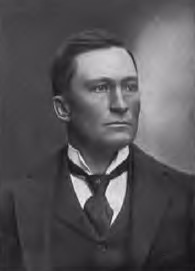 PRESTON, Byron
Webster, of Oskaloosa, recently county attorney of Mahaska
county, ranks well among the lawyers of central Iowa, and has
earned a wide reputation for fearlessness and honesty. His
father, Silvester S. Preston, a native of Vermont, was born
December 7, 1832; graduated from Harvard college, and for a
time read law. He came to Iowa in 1857 and settled on a farm
in Jasper county, near Newton. He enlisted in the army at the
breaking out of the war, and after its close continued farming
in Jasper county four years, when he moved to Marseilles,
111., and engaged in the mercantile business one year; then
established himself in business at Grinnell, where he
continued until 1885, since which time he has retired from
active business. Mr. Preston's mother, Amelia M. Wilde, was
born in New Hampshire, May 18, 1836, and died July 6, 1883.
PRESTON, Byron
Webster, of Oskaloosa, recently county attorney of Mahaska
county, ranks well among the lawyers of central Iowa, and has
earned a wide reputation for fearlessness and honesty. His
father, Silvester S. Preston, a native of Vermont, was born
December 7, 1832; graduated from Harvard college, and for a
time read law. He came to Iowa in 1857 and settled on a farm
in Jasper county, near Newton. He enlisted in the army at the
breaking out of the war, and after its close continued farming
in Jasper county four years, when he moved to Marseilles,
111., and engaged in the mercantile business one year; then
established himself in business at Grinnell, where he
continued until 1885, since which time he has retired from
active business. Mr. Preston's mother, Amelia M. Wilde, was
born in New Hampshire, May 18, 1836, and died July 6, 1883.
Byron W. Preston is a native of
Iowa, and was born February 13, 1858, in Newton, Jasper
county. He began his education in the country schools and
continued it in the public schools of Grinnell, whither he
moved with his parents when he was about 14 years old. He
attended, also, the Grinnell academy, and in 1876-7 was a
student at Eastman's Business college, in Poughkeepsie, N.
Y.
In 1877 he engaged in the
mercantile business at Grinnell with his father, under the
firm name of S. S. Preston & Son, at the same time
conducting a store in Newton. In 1881 he purchased his
father's interest, and for two years carried on the business
alone. He came to Oskaloosa July 31, 1883, and read law in the
office of Judge L. C. Blanchard. He studied day and night, and
was admitted to the bar of the Mahaska county circuit court in
March, 1884. Soon after his admission to the bar, the law was
changed so as to require a two-years' course of study, but,
though Mr. Preston had prepared in eight months, he had really
done two years' work in that time. He was employed by Judge
Blanchard a few months, and they then formed a partnership,
which lasted until 1891. In 1890 Mr. Preston was elected
county attorney of Mahaska county, serving as such for two
terms. During his administration he won the applause of all
law-loving people by his fearless prosecution of crime,
gaining the reputation among the district judges as being one
of the most fearless prosecutors in the state. He prosecuted
four murder cases, securing conviction in all of them. Since
retiring from office, in January, 1895, Mr. Preston has
practiced alone, and has been retained in many of the most
important cases tried in the county, including defense in four
murder cases, in all of which his clients were
acquitted.
Politically Mr. Preston has always
been an enthusiastic republican. He was chairman of the county
central committee in 1888-89, and in 1891 was a member of the
state central committee. In 1892 he was a candidate for
nomination as district judge, but was defeated by Hon. Ben
McCoy, who had a small majority over him, Mr. Preston standing
second, with five in the field. He was dissatisfied with the
St. Louis platform of 1896, as he is a strong bimetallist, but
he remained loyal to his party, nevertheless. He is a member of the
Masonic, Elks, Odd Fellows and Woodmen lodges. With the Masons
he is a Knight Templar, and as an Odd Fellow he belongs to the
encampment. He is
not a church member, but his people are Congregationalists and
his wife an Episcopalian. He was married October 6, 1880, at
Newton to Nellie Blanchard. They have two children: Edith,
born May 24, 1882, and a son, Blanchard W., born September 23,
1892.
Mr. Preston is just reaching the period
of his greatest usefulness, and is destined to fill still more
important places.
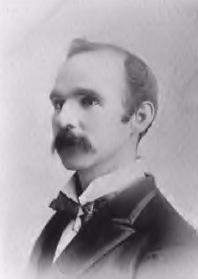 RICE, Hon. James A. The Hon. James
A. Rice, of Oskaloosa, was born in the city where he now
resides, September 30, 1855. He is the son of Gen.
Samuel A. Rice, who was attorney-general of Iowa from 1856 to
1860. General Rice was mustered into service as colonel of the
Thirty-third Iowa Volunteer infantry, October 1, 1862, and on
August 4, 1863, was promoted to brigadier-general. He was
wounded at the battle of Jenkin's Ferry, Ark., April 30, 1864,
from the effects of which he died July 6, 1864, at Oskaloosa.
A beautiful monument was erected to his memory by the
regiments of his brigade.
RICE, Hon. James A. The Hon. James
A. Rice, of Oskaloosa, was born in the city where he now
resides, September 30, 1855. He is the son of Gen.
Samuel A. Rice, who was attorney-general of Iowa from 1856 to
1860. General Rice was mustered into service as colonel of the
Thirty-third Iowa Volunteer infantry, October 1, 1862, and on
August 4, 1863, was promoted to brigadier-general. He was
wounded at the battle of Jenkin's Ferry, Ark., April 30, 1864,
from the effects of which he died July 6, 1864, at Oskaloosa.
A beautiful monument was erected to his memory by the
regiments of his brigade.
The mother of James A. Rice was
Louisa M. Alexander, daughter of Rev. James Alexander, D. D., of Virginia, a
Presbyterian minister of great prominence, who for more than
fifty years preached in Ohio, Pennsylvania and Virginia. He
wa9 a trustee of Washington and Jefferson colleges for thirty
years, as well as a director of the Western Theological
seminary. A large number of the 67 years of her life have been
devoted to the rearing of a large family, five of whom are now
living. Or late years, she has directed herself to the work of
the Woman's Relief corps. She organized the present corps at
Oskaloosa, and has been its president for three terms. Samuel
A. Rice was of Scotch-Irish descent, a graduate of Union
college, New York, and was selected to deliver the address of
welcome to Henry Clay on that illustrious patriot's visit to
the college.
James A. Rice attended the public
schools at Oskaloosa and then completed a classical course at
Washington and Jefferson college in Pennsylvania. He graduated
from the law department of the Iowa State university in the
class of 1877. He was a member of the Zethagathian society,
and the Union society at Washington and of the Delta Tau Delta
fraternity.
His first dollar was earned in the
trial of a case before a justice of the peace in Oskaloosa,
since which time he has been engaged in the practice of law in
that city. He was
elected mayor in March, 1878, and served two terms. During his
second term he was largely instrumental in securing for the
city its present fine system of water works. He was elected
city solicitor in 1881, and, as in the case of the mayoralty,
was re-elected at the close of his first term. While solicitor he
tested the right to assess resident agents of foreign loan
companies on moneys and credits at the residence of agent, and
was successful in maintaining the statute in the supreme
court; also tested the powers of corporations to grant
long-term franchises with exclusive right to occupy streets,
his position being that such powers were not granted by law,
and were void on grounds of public policy. This position was
also sustained by the supreme court in the case of the
Oskaloosa Gas Light Company v. City of Oskaloosa; also carried
to the supreme court the right to assess the property of
telephone companies where the office was located, and the case
of Iowa Union Telephone Company v. City of Okaloosa, settled
the mooted question of the law as applied to these
assessments. He
also tested the power of school boards to purchase maps and
charts when there were no funds on hand to pay for same,
claiming that any indebtedness incurred under such
circumstances was ultra vires and could not be collected. In
this position also he was sustained by the higher courts. He revised the city
ordinances of Oskaloosa in 1885. and the revision is
still in force.
He is a republican, but an ardent
advocate of bimetallism. He was a delegate to the republican
state convention at Cedar Rapids in 1891, and also to the one
which nominated Frank D. Jackson in 1895, in which last he
served as chairman on the committee on credentials. He was a
member of the executive committee from the Sixth district in
the republican state league in 1893, and was a delegate from
Iowa to the republican national league at Louisville, Ky., the
same year. He is a member of the Sons of Veterans and captain
of Gen. S. A. Rice Camp. He has served as chief mustering
officer of the United States for that organization and as
delegate to its national meetings.
He was married September 10, 1895, to
Miss Belle Gray, of Washington, Iowa, eldest daughter of
Capt. J. H. Gray.
She is a lady of high culture. She has held the
position of national president of the Ladies' Aid society for
two terms, and is now president of the King's Daughters, and
in October, 1898, was elected state secretary of the
international order of this society. They have one son, Samuel
Allen Rice. Mr. Rice is an orator of wide reputation. He was
chosen to deliver the address on General Grant in Oskaloosa in
1885, the centennial address, "Our Youth the Hope of America;"
another on Lincoln before the meeting of Lincoln league of
Iowa, held at Washington, Iowa, and many others on patriotic
and war subjects in many cities throughout the
country.
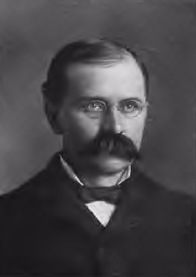 ROSENBERGER, Absalom, A. B., LL.B., president of
Penn college, Oskaloosa, has, by persistent hard
work, made a place for himself in life
where he is able to help others, and that is his highest aim.
Through a busy life he has held out the hand of strong and
helpful friendship to those he has been associated with. A
natural leader and teacher, with keen sympathy, well grounded
principles and an even temper, so he has made a lasting
impression for good upon the young people who came to him for
instruction. He has filled them with an ambition to go
farther, giving them what only a few teachers are ever able to
do, the desire to know more, the inspiration to dig and find
the treasures of human knowledge. The serious training of his
youth started young Rosenberger into the right path and
furnished the foundation, strong and enduring, upon which the
superstructure of a well-proportioned and useful life is
built.
ROSENBERGER, Absalom, A. B., LL.B., president of
Penn college, Oskaloosa, has, by persistent hard
work, made a place for himself in life
where he is able to help others, and that is his highest aim.
Through a busy life he has held out the hand of strong and
helpful friendship to those he has been associated with. A
natural leader and teacher, with keen sympathy, well grounded
principles and an even temper, so he has made a lasting
impression for good upon the young people who came to him for
instruction. He has filled them with an ambition to go
farther, giving them what only a few teachers are ever able to
do, the desire to know more, the inspiration to dig and find
the treasures of human knowledge. The serious training of his
youth started young Rosenberger into the right path and
furnished the foundation, strong and enduring, upon which the
superstructure of a well-proportioned and useful life is
built.
Born December 26, 1849, in a log
cabin near Thorntown, Ind., he did not have much of an
educational start in his boyhood, for the nearest school was
in a log schoolhouse in a dense forest five miles from
Thorntown, where the privileges were very meagre. But the boy
went to the little school, attended the meetings of the
Mortonian Literary society and debating club, and there became
filled with the desire to get an education. His parents were
of the kind to encourage this ambition.
His father was James Henry
Rosenberger, a farmer by occupation and a man of limited
circumstances. He was for many years a devout elder in the
Friends' church, to which the son has always remained
true. His mother
was Elizabeth Mills Rosenberger, a quiet, pious woman, whose
family came from England and helped William Penn in founding
Pennsylvania. She was much attached to her home. The father's
family came from Germany. The mother died when Absalom was 13
years old and the father when he was 16, leaving him to
support himself.
In 1872, Mr. Rosenberger entered
Earlham college, in Richmond, Ind., graduating from the
classical course in 1876. He was one of the editors of the
college paper for three years, and served as assistant proctor
for two years. With him attending college was serious
business, for he earned his own way and maintained a manly
independence that left him with few debts to pay at the end of
the four years' course. It is said of him by Dr. Joseph Moore,
president of the college at that time, that "He furnishes
another proof that the youth in college whose first and
highest work is to build up a character is pretty sure, later
in life, to build something else. Now well fitted for
teaching, Mr. Rosenberger entered the work of education and
spent ten years as an academic teacher, most of the time in
Union high school, a Friends' institution in Westfield, Ind.,
and it was in that field that he did some of his best work. He
was fresh from his own struggle for an education and he keenly
sympathized with every boy and girl who was trying to make
something of himself. He inspired them with some of his own
ambition, and by patience and forbearance and respect for the
opinion of his students, and an absence of dogmatism and
pedantry, exerted a powerful and lasting influence upon their
lives. He helped them in every possible way, to help
themselves, finding them places where they could earn their
board, when necessary.
In 1885, Mr. Rosenberger went to Ann Arbor, Mich., and
took the law course in the University of Michigan, graduating
in 1887, and at once entered upon the practice of his
profession at Wichita, Kan., where he remained three years,
returning to the teaching profession in 1890 as president of
Penn college, the place he now fills with so much credit.
While in the university in Ann
Arbor, Mr. Rosenberger enjoyed the privilege of being in the
classes of President Angell in international law and history
of diplomacy, constitutional law and history, under Judge
Thomas M. Cooley,
and economics under Dr. Adams. His previous training
and mental equipment made him a prominent figure in the class,
and he was persuaded to act as class historian, a duty
requiring much labor, which the class felt sure he would
perform. He was known as a plodder and one of the faculty has
said of him that "He soon won the good will of his fellows by
his candor and cordiality, by his culture and character." For
five years Mr. Rosenberger was a member of the board of
trustees of Earlham college, and has twice been appointed a
representative from the Iowa yearly meeting of Friends to the
quinquennial conferences of Friends of America held in the
city of Indianapolis in 1892 and 1897. He was a delegate from
Iowa to the national arbitration convention held in
Washington, D. C. in April, 1896. President Rosenberger is a
member of the republican party.
He was married September 5, 1877, to Miss
Martha Ellen Kendall, of Thorntown, Ind. They have five
children, Homer G., born January 17, 1880; Ethel C., born July
8, 1882; Lucile, born March 10, 1885; Frank Kendall, born
September 18, 1890, and Helen, born June 23,
1895.
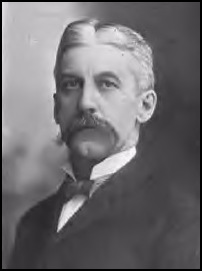 SEEVERS, George W., of Oskaloosa, general counsel
of the Iowa Central Rail-way company, came to Iowa when a boy,
in 1853, and settled on a farm. He is the son of Robert and
Ellen Bryan Seevers.
He was born September 23, 1846, in Coshocton county,
Ohio. He received his education in the public and private
schools of the state and in the University of Michigan, from
which he graduated in 1865. His first business partnership was
with Col. P. Gad Bryan in Indianola, Iowa, in the year 1868.
SEEVERS, George W., of Oskaloosa, general counsel
of the Iowa Central Rail-way company, came to Iowa when a boy,
in 1853, and settled on a farm. He is the son of Robert and
Ellen Bryan Seevers.
He was born September 23, 1846, in Coshocton county,
Ohio. He received his education in the public and private
schools of the state and in the University of Michigan, from
which he graduated in 1865. His first business partnership was
with Col. P. Gad Bryan in Indianola, Iowa, in the year 1868.
In 1888 he removed to Oskaloosa and
formed a partnership with Judge William H. Seevers after the
latter had retired from the supreme bench. The partnership
continued until the judge's death in 1894. George W. Seevers
continued in the general practice until 1897, when he was
appointed general counsel of the Iowa Central Railway company,
which position he still holds. He acquired his position in his
profession by constant, hard work, and by declining to be led
away from it by side attractions. He determined to make the
practice of law exclusively and solely his life work, and with
a rich, natural, intelligent endowment his habits of industry
have brought him distinguished success. He is an earnest
republican and a close student of politics in the higher
sense, but has never held an office, and declares that he will
not so long as he practices law. Mr. Seevers is regarded as
one of the ablest lawyers in the state, and his practice
demonstrates that this is the public estimate of his ability.
He was married in February, 1868, to Mary L. Bryan. They have
five children, four sons and one
daughter.